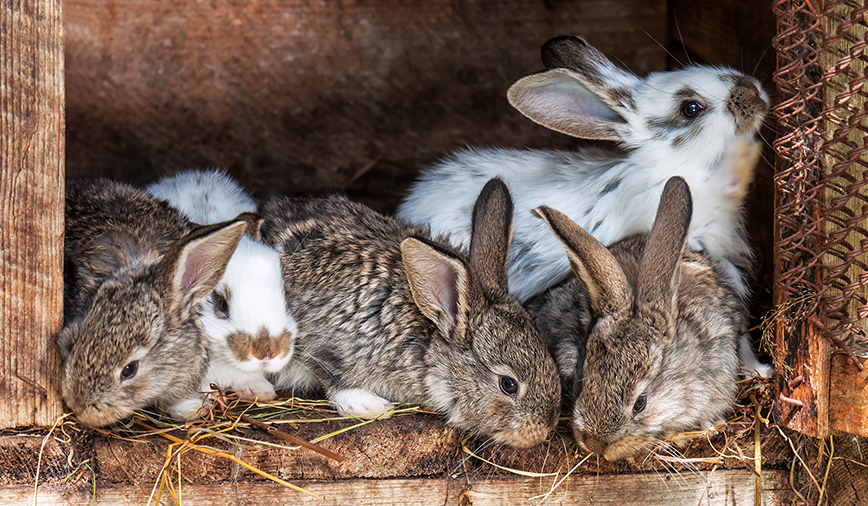April 11, 2014
Bunnies
With temperatures finally on the rise—well , til Monday anyway—the signs of spring are all around. Robins singing territory songs. Wildflowers poking up through the soil. A worm on the sidewalk.
You’d think—as I did—that all these welcome indicators, wrapped up in a nice, 600-word package, would make for an enjoyable, nature-themed reading experience. There I was, typing away, waxing elegant on midge hatches and the first bee of spring, when, suddenly, a completely different topic popped up.
Or maybe I should say hopped up.
Not to me, but to Tim Timberlake, one of the St. Charles Park District’s park safety officers.
Tim had just started his shift last Sunday when he received a call from a resident reporting rabbits at Ferson Creek Fen. That would be well and good, if the rabbits were eastern cottontails, Sylvilagus floridanus, our area’s native lagomorphs. But no, these were domestic rabbits. Or, as Tim put it, “Bunnies. A whole box of ’em.”
Eight, to be exact.
When Tim arrived on the scene, he found a large box on its side, with seven young rabbits huddled inside and the eighth hopping timidly around in the grass. Although they were dirty, and one was missing an ear, Tim could tell that these animals bore little resemblance to the gray-brown wild cottontails that populate our preserves and parks, yards and gardens.
Some were black and white, some were gray, one was white and brown. All of them, Tim noted, were really cute, and horribly out of place.
It might be tempting to think, as perhaps the person who left them did, that pet rabbits would do just fine in the wild. They eat grass, like wild rabbits do, and they can hop pretty fast, just like their wild cousins.
The truth is, pet bunnies, whose appetites run toward the pellets-n-greens end of the spectrum, and whose predator-avoidance skills are rusty at best, belong in the wild about as much as a cocker spaniel belongs with a pack of wolves.
Domestic rabbits are descended, not from the North American Sylvilagus spp., but from the European Oryctolagus cuniculus. For centuries this species has been bred, first for meat and fur, then for qualities such as temperament and size.
Not only is it not fair to let a pet rabbit go in a preserve or park, it’s also illegal. Our local park districts as well as the Kane County Forest Preserve District all have ordinances prohibiting anything being released on their properties.
Then there’s the matter of disease transmission. Pet rabbits harbor a different set of microorganisms than those found in wild rabbits. They can catch diseases in the wild, and they can spread diseases to the wild.
When Tim called me to report his find, he was hoping I could provide a list of rabbit rescue groups in the area. There are several, for sure. In fact Hickory Knolls’ own Peter Rabbit came from our friends at the Fur Angels Animal Sanctuary in Aurora.
With a little time I’m sure we could have delivered the Ferson bunnies to rescues and shelters all over northern Illinois. But my scheduled didn’t permit that, nor did Tim’s. Instead he reached out to the fine folks at Critters Pet Shop, who took not just one but all eight rabbits and immediately started giving them the care they had needed for long. Baths to get rid of the dirt and smell. Medication to get rid of parasites. Food and water, because all were thin and dehydrated.
I called Critters yesterday to get an update on how the rabbits are doing. Happily, one has already found a new home, and six others are now up for adoption. The bunny with the missing ear is still undergoing some treatment, as it also was found to be missing two feet.
With Easter coming, the Critters staff will be making doubly sure that each of these remaining rabbits will be going to a forever home, not just a home where the people think pet bunnies make good Easter basket gifts. Domestic rabbits live 10 years or more. They, like all pets, require a significant commitment and aren’t the sort of thing you can just neglect or toss out after a few weeks.
If you know of someone who’s thinking of acquiring a pet rabbit, make sure they know they’re responsible for that pet for its entire life, not just until the thrill wears off. And if you hear of someone who’s going to take his or her bunny and “set it free,” step in and share what you know.
Great outdoor spaces like Ferson Creek Fen are absolutely wonderful destinations for taking in the sights and sounds of spring. But they make absolutely awful homes for pets.
Pam Otto is the manager of nature programs and interpretive services at the Hickory Knolls Discovery Center, a facility of the St. Charles Park District. She can be reached at 630-513-4346 or potto@stcparks.org.

